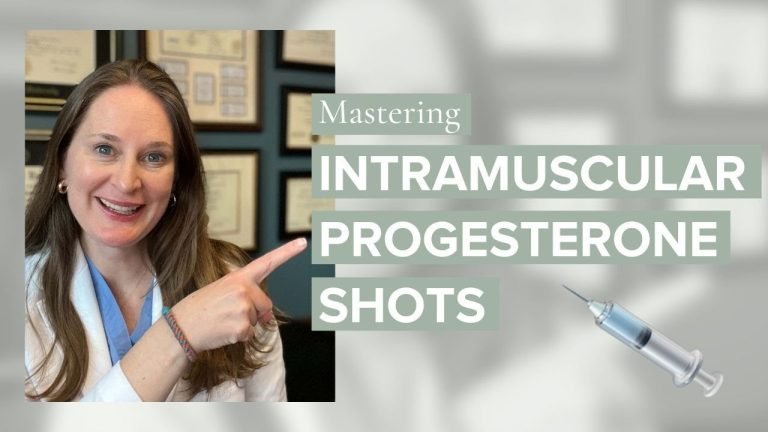Optimal Duration of Progesterone Shots Post IVF Transfer

Are you currently undergoing IVF treatment and wondering how long you will need to take progesterone shots after the embryo transfer? This is a common question for many women going through the IVF process. In this article, we will provide you with all the information you need to know about the duration of progesterone shots after IVF transfer, helping to ease any uncertainty and provide clarity on this important aspect of your fertility journey.
What are the consequences of missing a progesterone shot after embryo transfer?
Missing a progesterone shot after embryo transfer can significantly impact the success of your IVF treatment. Progesterone plays a crucial role in preparing the uterus for implantation and supporting early pregnancy. Therefore, a missed dose can jeopardize the chances of a successful pregnancy. It's important to be diligent about following your treatment plan to give yourself the best possible chance of achieving a positive outcome.
Is it safe to stop progesterone at 12 weeks?
Yes, it is generally safe to stop taking progesterone supplements at 12 weeks of pregnancy. This is because by this time, the placenta has taken over the production of progesterone, and your hormone levels will continue to rise naturally throughout the rest of your pregnancy. Therefore, there is no need for additional progesterone supplementation after the first trimester.
What is the duration for progesterone oil injections?
After ovulation or embryo transfer, progesterone in oil injections are typically taken for the first 6 to 12 weeks of pregnancy, as advised by your healthcare provider. The timing and duration of the daily injections will vary for each individual, so it's important to follow your provider's instructions closely.
Maximizing Success: The Best Timing for Progesterone Shots After IVF
Timing is everything when it comes to maximizing success after IVF. Progesterone shots are a crucial component of the IVF process, and the timing of when they are administered can greatly impact the chances of a successful pregnancy. Research has shown that the best timing for progesterone shots after IVF is during the luteal phase, specifically around five to seven days after the embryo transfer. This is when the body naturally produces progesterone to support a potential pregnancy, and supplementing with additional progesterone shots during this time can help increase the chances of implantation and a successful pregnancy.
The luteal phase is a critical time for embryo implantation, making it the ideal window for administering progesterone shots. By closely aligning the timing of progesterone supplementation with the body's natural hormone production, the chances of a successful pregnancy can be significantly improved. Studies have shown that the timing of progesterone shots can impact the chances of implantation and ongoing pregnancy, making it crucial to carefully consider when to begin progesterone supplementation after IVF.
In conclusion, maximizing success after IVF involves careful consideration of the timing of progesterone shots. By aligning the timing of supplementation with the luteal phase, specifically around five to seven days after embryo transfer, the chances of a successful pregnancy can be greatly increased. Understanding the best timing for progesterone shots after IVF is crucial for achieving optimal outcomes and increasing the chances of a successful pregnancy.
Finding the Sweet Spot: The Ideal Window for Progesterone Shots Following IVF Transfer
When it comes to the success of IVF transfer, timing is everything. Finding the sweet spot for progesterone shots is crucial in ensuring the best possible outcome. Research and experience have shown that administering progesterone shots within a specific window after the transfer greatly improves the chances of successful implantation. By understanding and adhering to this ideal window, patients can optimize their chances of a successful pregnancy following IVF transfer. It's important for both healthcare providers and patients to be aware of and follow the recommended timing for progesterone shots to maximize the potential for a positive outcome.
The Key to Success: Determining the Optimal Duration of Progesterone Shots Post IVF Transfer
Striking the right balance in the duration of progesterone shots post IVF transfer is crucial for a successful outcome. Research has shown that the optimal duration of progesterone supplementation can significantly impact the chances of a successful pregnancy. By carefully determining the ideal length of time for progesterone shots, fertility specialists can maximize the chances of successful implantation and reduce the risk of miscarriage, ultimately increasing the likelihood of a successful IVF outcome.
The key to success in IVF lies in understanding the importance of determining the optimal duration of progesterone shots post-transfer. By carefully considering the individual needs of each patient and tailoring the progesterone supplementation accordingly, fertility specialists can greatly improve the chances of a successful pregnancy. This personalized approach to progesterone supplementation can make a significant difference in the outcome of IVF treatments, highlighting the crucial role of determining the optimal duration of progesterone shots in achieving successful results.
In conclusion, the duration of progesterone shots following an IVF transfer can vary depending on individual circumstances and medical advice. While some women may continue with progesterone shots for up to 10-12 weeks, others may only need them for a shorter period of time. It is crucial to follow your doctor's recommendations and to communicate any concerns or side effects promptly. Ultimately, the goal is to support the early stages of pregnancy and ensure the best possible outcome for the IVF transfer.
